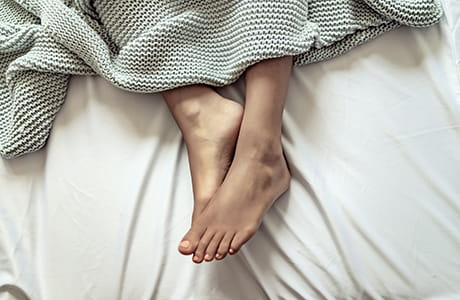Considering a sleep aid? Talk to your doctor first.
Many over-the-counter products claim to help with sleep, but they aren’t a long-term cure for sleep woes.
By: Dr. Grace Guerrier, internal medicine doctor at Geisinger’s Berwick clinic.
When you don’t get enough rest, it can make for a rough next day. If you’re feeling sleep deprived, It may be tempting to enlist the help of a sleep aid. But, by talking to your doctor and making a few lifestyle changes, you can focus on getting the best Zzz’s possible.
Know the sleep aid lineup
Over-the-counter sleep aids or supplements are marketed as tools to help with the occasional sleepless night. They’re available over-the-counter at most stores and online or by prescription.
They work in a few different ways. Some use ingredients that help you feel relaxed and sleepy. Others affect the part of your brain responsible for keeping you alert.
Sleep supplements come in a few different forms, including:
- Capsules
- Tablets
- Gummies
- Liquid
- Tea
Some claim to deliver the best night’s rest you’ve ever had. What they don’t tell you, though, is that they aren’t approved by the U.S. Food & Drug Administration or the American Academy of Sleep Medicine to treat sleeplessness. That means if you’re struggling with rest, a sleep supplement may not be the best choice.
Available options
Browse your local drug store and you’re likely to find a multitude of options claiming to deliver a great night’s sleep.
Popular varieties include:
Diphenhydramine. Commonly used as an anti-itch and allergy medicine, diphenhydramine is also used as a sleep aid. It makes you feel relaxed and drowsy.
Doxylamine succinate. This sleep aid works with neurotransmitters in your brain to cause sleepiness.
Melatonin. This hormone regulates your sleep-wake cycle. At appropriate doses, melatonin can help you fall asleep a little faster. If your circadian rhythm is disturbed, like from jet lag, melatonin can help you get back to a normal schedule.
But watch out for side effects
Sleep aids have the potential to cause side effects, including:
- Rebound insomnia. It may sound counterintuitive, but using a sleep aid may make it harder for you to sleep in the future.
- Drug interactions. Sleep aids and other medications you’re taking can interact with each other. Another consideration? Potential food and drug interactions.
- Next-day fatigue. Using sleep aids can lead to next-day grogginess or a “hangover” effect.
- Increased tolerance. Your tolerance to sleep supplements changes over time. That means the longer you take them, the less effective they become.
Looking for better rest? Start with a conversation.
Instead of buying a sleep supplement, talk to your healthcare provider. They may refer you to a sleep medicine specialist who might suggest a sleep study or other tests to determine if you have a sleep disorder. Or they may offer suggestions to help you sleep better, like:
- Practicing meditation
- Using a white noise machine
- Maintaining a consistent sleep schedule
- Creating a restful sleep environment
- Avoiding caffeine four to six hours before bedtime
- Limiting length of daytime naps
- Putting down your smartphone or tablet one hour before bed
Next steps:
Meet Dr. Grace Guerrier
Not getting enough zzz’s? Your evening cocktails could be to blame
Pediatric sleep disorders can keep the whole family up at night





